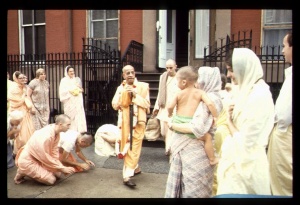SB 4.3.19: Difference between revisions
m (1 revision(s)) |
(Vanibot #0054 edit - transform synonyms into clickable links, which search similar occurrences) |
||
| (One intermediate revision by one other user not shown) | |||
| Line 1: | Line 1: | ||
{{info | {{info | ||
|speaker=Lord | |speaker=Lord Śiva | ||
|listener=Satī, wife of Lord | |listener=Satī, wife of Lord Śiva | ||
}} | }} | ||
[[Category:Srimad-Bhagavatam - Canto 04 Chapter 03]] | |||
[[Category:Bhagavatam Verses Spoken by Lord Siva - Vanisource|040319]] | |||
<div style="float:left">'''[[Srimad-Bhagavatam]] - [[SB 4|Fourth Canto]] - [[SB 4.3: Talks Between Lord Siva and Sati|Chapter 3: Talks Between Lord Śiva and Satī]]'''</div> | |||
<div style="float:right">[[File:Go-previous.png|link=SB 4.3.18]] '''[[SB 4.3.18]] - [[SB 4.3.20]]''' [[File:Go-next.png|link=SB 4.3.20]]</div> | |||
{{RandomImage}} | |||
==== TEXT 19 ==== | ==== TEXT 19 ==== | ||
<div | <div class="verse"> | ||
tathāribhir na vyathate śilīmukhaiḥ | :tathāribhir na vyathate śilīmukhaiḥ | ||
śete 'rditāṅgo hṛdayena dūyatā | :śete 'rditāṅgo hṛdayena dūyatā | ||
svānāṁ yathā vakra-dhiyāṁ duruktibhir | :svānāṁ yathā vakra-dhiyāṁ duruktibhir | ||
divā-niśaṁ tapyati marma-tāḍitaḥ | :divā-niśaṁ tapyati marma-tāḍitaḥ | ||
</div> | </div> | ||
| Line 16: | Line 22: | ||
==== SYNONYMS ==== | ==== SYNONYMS ==== | ||
<div | <div class="synonyms"> | ||
''[//vanipedia.org/wiki/Special:VaniSearch?s=tathā&tab=syno_o&ds=1 tathā]'' — so; ''[//vanipedia.org/wiki/Special:VaniSearch?s=aribhiḥ&tab=syno_o&ds=1 aribhiḥ]'' — enemy; ''[//vanipedia.org/wiki/Special:VaniSearch?s=na&tab=syno_o&ds=1 na]'' — not; ''[//vanipedia.org/wiki/Special:VaniSearch?s=vyathate&tab=syno_o&ds=1 vyathate]'' — is hurt; ''[//vanipedia.org/wiki/Special:VaniSearch?s=śilīmukhaiḥ&tab=syno_o&ds=1 śilīmukhaiḥ]'' — by the arrows; ''[//vanipedia.org/wiki/Special:VaniSearch?s=śete&tab=syno_o&ds=1 śete]'' — rests; ''[//vanipedia.org/wiki/Special:VaniSearch?s=ardita&tab=syno_o&ds=1 ardita]'' — aggrieved; ''[//vanipedia.org/wiki/Special:VaniSearch?s=aṅgaḥ&tab=syno_o&ds=1 aṅgaḥ]'' — a part; ''[//vanipedia.org/wiki/Special:VaniSearch?s=hṛdayena&tab=syno_o&ds=1 hṛdayena]'' — by the heart; ''[//vanipedia.org/wiki/Special:VaniSearch?s=dūyatā&tab=syno_o&ds=1 dūyatā]'' — grieving; ''[//vanipedia.org/wiki/Special:VaniSearch?s=svānām&tab=syno_o&ds=1 svānām]'' — of relatives; ''[//vanipedia.org/wiki/Special:VaniSearch?s=yathā&tab=syno_o&ds=1 yathā]'' — as; ''[//vanipedia.org/wiki/Special:VaniSearch?s=vakra&tab=syno_o&ds=1 vakra]-[//vanipedia.org/wiki/Special:VaniSearch?s=dhiyām&tab=syno_o&ds=1 dhiyām]'' — deceitful; ''[//vanipedia.org/wiki/Special:VaniSearch?s=duruktibhiḥ&tab=syno_o&ds=1 duruktibhiḥ]'' — by harsh words; ''[//vanipedia.org/wiki/Special:VaniSearch?s=divā&tab=syno_o&ds=1 divā]-[//vanipedia.org/wiki/Special:VaniSearch?s=niśam&tab=syno_o&ds=1 niśam]'' — day and night; ''[//vanipedia.org/wiki/Special:VaniSearch?s=tapyati&tab=syno_o&ds=1 tapyati]'' — suffers; ''[//vanipedia.org/wiki/Special:VaniSearch?s=marma&tab=syno_o&ds=1 marma]-[//vanipedia.org/wiki/Special:VaniSearch?s=tāḍitaḥ&tab=syno_o&ds=1 tāḍitaḥ]'' — one whose feelings are hurt. | |||
</div> | </div> | ||
| Line 23: | Line 29: | ||
==== TRANSLATION ==== | ==== TRANSLATION ==== | ||
<div | <div class="translation"> | ||
Lord Śiva continued: If one is hurt by the arrows of an enemy, one is not as aggrieved as when cut by the unkind words of a relative, for such grief continues to rend one's heart day and night. | Lord Śiva continued: If one is hurt by the arrows of an enemy, one is not as aggrieved as when cut by the unkind words of a relative, for such grief continues to rend one's heart day and night. | ||
</div> | </div> | ||
| Line 30: | Line 36: | ||
==== PURPORT ==== | ==== PURPORT ==== | ||
<div | <div class="purport"> | ||
Satī might have concluded that she would take the risk of going to her father's house, and even if her father spoke unkindly against her she would be tolerant, as a son sometimes tolerates the reproaches of his parents. But Lord Śiva reminded her that she would not be able to tolerate such unkind words because natural psychology dictates that although one can suffer harm from an enemy and not mind so much because pain inflicted by an enemy is natural, when one is hurt by the strong words of a relative, one suffers the effects continually, day and night, and sometimes the injury becomes so intolerable that one commits suicide. | Satī might have concluded that she would take the risk of going to her father's house, and even if her father spoke unkindly against her she would be tolerant, as a son sometimes tolerates the reproaches of his parents. But Lord Śiva reminded her that she would not be able to tolerate such unkind words because natural psychology dictates that although one can suffer harm from an enemy and not mind so much because pain inflicted by an enemy is natural, when one is hurt by the strong words of a relative, one suffers the effects continually, day and night, and sometimes the injury becomes so intolerable that one commits suicide. | ||
</div> | </div> | ||
__NOTOC__ | |||
<div style="float:right; clear:both;">[[File:Go-previous.png|link=SB 4.3.18]] '''[[SB 4.3.18]] - [[SB 4.3.20]]''' [[File:Go-next.png|link=SB 4.3.20]]</div> | |||
__NOTOC__ | |||
__NOEDITSECTION__ | |||
Latest revision as of 21:48, 18 February 2024

A.C. Bhaktivedanta Swami Prabhupada
TEXT 19
- tathāribhir na vyathate śilīmukhaiḥ
- śete 'rditāṅgo hṛdayena dūyatā
- svānāṁ yathā vakra-dhiyāṁ duruktibhir
- divā-niśaṁ tapyati marma-tāḍitaḥ
SYNONYMS
tathā — so; aribhiḥ — enemy; na — not; vyathate — is hurt; śilīmukhaiḥ — by the arrows; śete — rests; ardita — aggrieved; aṅgaḥ — a part; hṛdayena — by the heart; dūyatā — grieving; svānām — of relatives; yathā — as; vakra-dhiyām — deceitful; duruktibhiḥ — by harsh words; divā-niśam — day and night; tapyati — suffers; marma-tāḍitaḥ — one whose feelings are hurt.
TRANSLATION
Lord Śiva continued: If one is hurt by the arrows of an enemy, one is not as aggrieved as when cut by the unkind words of a relative, for such grief continues to rend one's heart day and night.
PURPORT
Satī might have concluded that she would take the risk of going to her father's house, and even if her father spoke unkindly against her she would be tolerant, as a son sometimes tolerates the reproaches of his parents. But Lord Śiva reminded her that she would not be able to tolerate such unkind words because natural psychology dictates that although one can suffer harm from an enemy and not mind so much because pain inflicted by an enemy is natural, when one is hurt by the strong words of a relative, one suffers the effects continually, day and night, and sometimes the injury becomes so intolerable that one commits suicide.